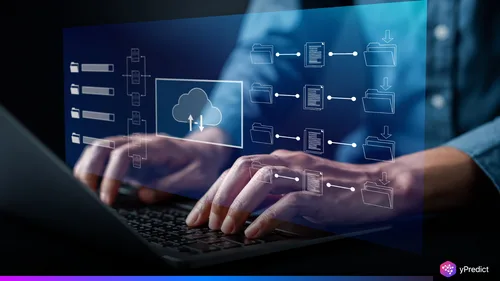
Artificial intelligence has moved beyond experiments and now drives real change across industries. It handles large complex tasks and adds new tools into existing systems. This creates an intelligent ecosystem that reduces work once needing human specialization.
Many fear AI will fully replace jobs, but the shift looks different. AI will not erase knowledge work overnight. Instead, it will blend into current workflows, taking over repetitive and analytical tasks. This shift allows professionals to focus on creativity, strategy, and problem solving, which remain uniquely human. The changes may seem gradual, but industries already feel the impact.
With innovation moving fast, the question has changed. It is no longer about whether AI will affect jobs. The real question is how deeply it will reshape the future of work. Businesses and individuals must understand this shift now to prepare for an era where humans and AI work together.
The Rise of AI in Knowledge Work
AI in knowledge work is advancing quickly and everyday new tools for tackling specific problems are being released. There are so many chores that AI is available to take over that came take a full day for each report, check your facts, summarize findings, etc. What AI has freed professionals up from is time wasting. Instead of free time to engage in meaningful work, people will have more bandwidth to collaborate and create things together.
As AI integrates with other AI tools, they will design a seamless experience. A tool will take raw data and analyze it, another will read trends, and another will present it with their visualization tool. Together they would make sizeable decisions more efficient and quickly than ever before.
Why the Shift Will Be Gradual
AI transformation, no matter how powerful, is still not going to happen overnight. It is going to take time to adopt AI at scale because organizations have to put in the infrastructure, training, and have trust in the technology. Many organizations aren’t even at the point of thinking about transformation; they are struggling to reconcile AI applications with existing systems. Also, ethical, transparent, and accountable AI usage is still of the highest concern for organizations.
The gradual shift also allows industries to embrace AI technologies whilst still adapting normally and not urgently. It gives workers time to upskill, organizations to experiment, and regulators to build fair and ethical frameworks. It will be a phased transition, which allows organizations to transition slowly and safely away from chaos, whilst still being innovative.
The Impact on the Future of Jobs
The jobs of the future will be quite different as AI continues to take on more specialized knowledge work. Jobs that focus on repetitive analysis or documentation will become less in demand, whereas those requiring creativity, empathy, and critical thinking will see increased demand. Many believe AI will create a similar number of opportunities as it does displacement. For example, these industries include things like healthcare, finance, and legal services are already going through this shift. AI can process very large quantities of information, but human professionals continue to be needed to help each other guide, interpret and apply insights. This partnership demonstrates, again, how AI is not meant to replace, but multiply human potential.
Opportunities in the Age of AI Transformation
The greatest part about AI transformation is the prospect of new industries and roles. The invention of digital marketing, e-commerce, and cybersecurity has come about through innovation and adoption of the internet, and the invention, adoption, and commercialization of AI will create demand for prompt engineers, data ethicists, and AI trainers. The new jobs stemming from technology advancements show how industries change the labor market in ways we wouldn’t have expected.
Likewise, knowledge work companies using AI get the generalized benefits of being competitive. Formed in AI, they decreased costs, improved accuracy, and outperformed timelines. Companies that adopt AI first create significant barriers to competitors behind, creating industry leaders and laggards.
Human-AI Collaboration as the Next Big Shift
Instead of seeing AI as an imminent threat to be feared, workforces should look at it as a neighbor. Pairing machines and humans yields exponential productivity gains. Humans can invent, and machines can focus on structured activities. They can engineer to include smarter, faster, and more resilient workflows.
This change will come gradually, leaving time for sectors to get their heads around the whole concept. The future of work is not about either humans or AI, it is about humans working together with AI.
Final Thoughts
The evolution in knowledge work is not a change in kind, but a change in definition. AI in knowledge work is closing gaps, limiting barriers and enabling humans to do more, AI transformation is happening now and the speed at which it is happening gives organizations and individuals time to adapt their roles, capabilities and redesign how they will collaborate into the future. The future of jobs will be determined through collaboration, innovation, and resilience.
By acknowledging these changes today, organizations and individuals can position themselves to prepare for a world where intelligence, both natural and artificial, will unlock new horizons. AI will not signify an end. AI is the start of our transformation in how we work and what we can accomplish.






